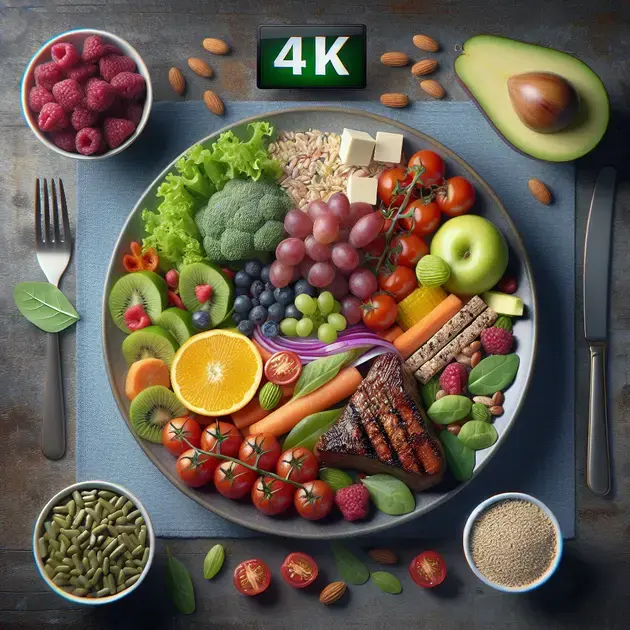
Looking to shed those extra pounds without feeling like you’re missing out? You’re in luck! In this post, we will share some valuable tips to successfully lose weight without feeling deprived. Say goodbye to crash diets and hello to a sustainable and enjoyable weight loss journey.
With the right strategies and mindset, you can achieve your weight loss goals while still enjoying your favorite foods. Let’s dive into some practical tips and tricks that will help you on your path to a healthier and happier you.

Practical Strategies for Successful Weight Loss
When it comes to achieving successful weight loss, it’s important to implement practical strategies that are sustainable in the long run. One effective strategy is to track your food intake and exercise using apps like MyFitnessPal or Lose It!. These apps help you monitor your daily calories, macros, and exercise routines, allowing you to make informed decisions about your health.
Another practical strategy is to meal prep and plan your meals in advance. Websites like MealPrepPro or Mealime offer customizable meal plans and recipes to help you stay on track with your weight loss goals. By preparing your meals ahead of time, you can avoid impulsive food choices and ensure that you’re fueling your body with nutritious options.
Setting realistic and achievable goals is also crucial for successful weight loss. Apps like HabitBull or Strides allow you to track your progress and build healthy habits over time. By breaking down your goals into smaller milestones, you can stay motivated and focused on your weight loss journey.
Staying active and incorporating regular exercise into your routine is key to successful weight loss. Fitness apps like Fitbit or Nike Training Club provide guided workouts and activity tracking to help you stay accountable and motivated. Whether it’s going for a run, taking a yoga class, or lifting weights, finding an exercise routine that you enjoy is essential for long-term success.
Lastly, seeking support from friends, family, or online communities can boost your motivation and accountability. Websites like MyFitnessPal’s community forums or Reddit’s r/loseit subreddit offer a supportive environment where you can share your progress, struggles, and victories with others on a similar journey. By connecting with like-minded individuals, you can stay inspired and committed to your weight loss goals.
Mindful Eating: Enjoying Food Without Guilt
Mindful eating is a practice that involves being present and attentive while consuming food, without judgment or guilt. One way to incorporate mindful eating into your routine is to use apps like Eat Right Now or Mindful Eating Tracker, which provide guided meditations and tools to help you cultivate a mindful eating mindset.
Before eating, take a moment to pause and assess your hunger cues. Ask yourself if you’re truly hungry or if you’re eating out of boredom, stress, or habit. Apps like Am I Hungry? or Rise Up + Recover can help you tune into your body’s signals and make conscious decisions about when and what to eat.
Practice savoring each bite and appreciating the flavors, textures, and aromas of your food. Slow down and chew your food thoroughly, giving your body time to register when it’s full. Apps like Headspace or Calm offer mindful eating exercises and meditations to help you cultivate a sense of gratitude and awareness around your meals.
Avoid distractions while eating, such as watching TV or scrolling through your phone. Create a peaceful environment free from distractions, allowing yourself to focus solely on the act of eating. By engaging all your senses and being fully present, you can enhance your mealtime experience and prevent mindless overeating.
Practice self-compassion and gentleness towards yourself if you veer off track or overindulge. Mindful eating is about developing a positive and non-judgmental relationship with food, so be kind to yourself during moments of slip-ups or cravings. Remember that each meal is a new opportunity to practice mindfulness and nourish your body with intention.
Creating a Sustainable Weight Loss Plan
Building a sustainable weight loss plan involves incorporating healthy habits that you can maintain in the long term. Start by assessing your current lifestyle and identifying areas where you can make small, manageable changes. Websites like Precision Nutrition or Noom offer personalized coaching and nutrition plans to help you create a sustainable weight loss strategy.
Set realistic and specific goals that align with your values and priorities. Whether it’s losing a certain amount of weight, improving your fitness level, or boosting your overall well-being, having clear goals can keep you focused and motivated. Apps like Fabulous or SparkPeople offer goal-setting features and progress tracking to help you stay on course.
Focus on building a balanced and varied diet that includes a variety of nutrient-dense foods. Websites like ChooseMyPlate or the USDA’s SuperTracker tool provide guidance on portion sizes, food group recommendations, and meal planning tips. By incorporating fruits, vegetables, lean proteins, and whole grains into your meals, you can create a sustainable eating plan that supports your weight loss goals.
Engage in regular physical activity that you enjoy and fits your schedule. Whether it’s walking, dancing, cycling, or swimming, find activities that bring you joy and make movement a natural part of your daily routine. Fitness apps like Couch to 5K or FitOn offer workout plans and exercise routines that cater to all fitness levels and preferences.
Monitor your progress and make adjustments as needed to ensure continued success. Keep a journal or use apps like Daylio or My Diet Coach to track your meals, emotions, and progress towards your goals. By staying accountable and reflecting on your habits, you can fine-tune your weight loss plan and make sustainable changes for a healthier lifestyle.

Balancing Nutrition and Exercise for Weight Loss Success
When it comes to achieving weight loss success, finding the right balance between nutrition and exercise is key. Nutrition plays a vital role in fueling your body for physical activity and supporting overall health. Focus on consuming a variety of nutrient-dense foods such as fruits, vegetables, whole grains, lean proteins, and healthy fats. By incorporating these foods into your diet, you can support your energy levels and enhance your workout performance.
On the other hand, exercise is essential for burning calories, building muscle, and boosting your metabolism. Aim for a combination of cardiovascular exercise, strength training, and flexibility exercises to achieve a well-rounded fitness routine. Cardiovascular activities like running, cycling, or swimming can help you burn fat, while strength training exercises such as weightlifting can increase muscle mass and improve your metabolism.
To balance nutrition and exercise effectively, consider tracking your food intake and physical activity. Keep a food journal to monitor your meals and snacks, and use a fitness tracker to record your workouts and daily steps. By tracking these metrics, you can make informed decisions about your eating and exercise habits, ultimately leading to weight loss success.
Remember that every individual is unique, so it may take some time to find the right balance that works for you. Consult with a healthcare provider or a nutritionist to create a personalized plan that aligns with your goals and lifestyle. With dedication, consistency, and the right balance of nutrition and exercise, you can achieve weight loss success in a sustainable way.
Healthy Habits for Long-Term Weight Management
When it comes to maintaining a healthy weight in the long term, cultivating healthy habits is essential. Focus on establishing a balanced and sustainable eating pattern that consists of whole foods, plenty of fruits and vegetables, lean proteins, and whole grains. Avoid restrictive diets or quick fixes, as these are often not sustainable and can lead to weight fluctuations.
In addition to nutrition, incorporating regular exercise into your routine is crucial for long-term weight management. Aim to engage in physical activity that you enjoy, whether it’s going for a walk, attending fitness classes, or participating in sports. Consistency is key, so create a workout schedule that fits your lifestyle and goals.
Along with nutrition and exercise, prioritize other aspects of your health such as stress management, adequate hydration, and quality sleep. Chronic stress can lead to emotional eating and weight gain, so find healthy ways to cope with stress such as meditation, yoga, or deep breathing exercises. Proper hydration is also important for overall health and can support weight management by keeping you feeling full and hydrated.
Lastly, don’t overlook the role of sleep in maintaining a healthy weight. Poor sleep habits can disrupt your hunger hormones and metabolism, leading to weight gain over time. Aim for 7-9 hours of quality sleep each night by establishing a bedtime routine, creating a restful sleep environment, and avoiding screen time before bed. By prioritizing healthy habits across nutrition, exercise, stress management, hydration, and sleep, you can achieve long-term weight management success.
The Role of Sleep in Supporting Weight Loss
Quality sleep is often overlooked but plays a crucial role in supporting weight loss efforts. When you don’t get enough sleep, it can disrupt your hunger hormones and lead to increased cravings for high-calorie foods. Additionally, lack of sleep can impact your energy levels and workout performance, making it harder to stay active and burn calories.
During deep sleep, the body repairs and regenerates tissues, balances hormones, and processes memories. These functions are essential for overall health and can influence your body’s ability to regulate metabolism and weight. Prioritizing sleep hygiene practices such as maintaining a consistent sleep schedule, creating a dark and quiet sleep environment, and avoiding caffeine and electronics before bedtime can improve the quality of your sleep.
To support weight loss through better sleep, aim to establish a relaxing bedtime routine that signals to your body that it’s time to wind down. This can include activities such as reading a book, taking a warm bath, or practicing gentle stretching exercises. By incorporating these habits into your nightly routine, you can promote better sleep quality and in turn, support your weight loss goals.
Remember that a holistic approach to weight loss includes not only nutrition and exercise but also adequate and restorative sleep. By recognizing the importance of sleep in supporting your weight loss journey and prioritizing healthy sleep habits, you can optimize your overall well-being and achieve sustainable results in your weight management efforts.
Conclusion
Effective weight loss success relies on finding the right balance between nutrition and exercise. Nutrition plays a crucial role in fueling your body for physical activity and supporting overall health. Emphasize consuming a variety of nutrient-dense foods like fruits, vegetables, whole grains, lean proteins, and healthy fats to boost energy levels and enhance workout performance.
Exercise is essential for burning calories, building muscle, and improving metabolism. Strive for a mix of cardiovascular activities, strength training, and flexibility exercises to create a well-rounded fitness routine. Cardio exercises like running and swimming aid fat burning, while strength training such as weightlifting boosts muscle mass and metabolism.
To achieve a harmonious balance between nutrition and exercise, consider tracking your food intake and physical activity. Maintain a food journal to monitor meals and snacks, and utilize a fitness tracker to record workouts and daily steps. By monitoring these metrics, informed decisions can be made about eating and exercise habits, leading to sustainable weight loss success.
Remember, individual uniqueness may require time to discover the optimal balance. Consult healthcare providers or nutritionists to craft a personalized plan aligning with your goals and lifestyle. With dedication, consistency, and the right blend of nutrition and exercise, lasting weight loss success can be attained in a sustainable manner.